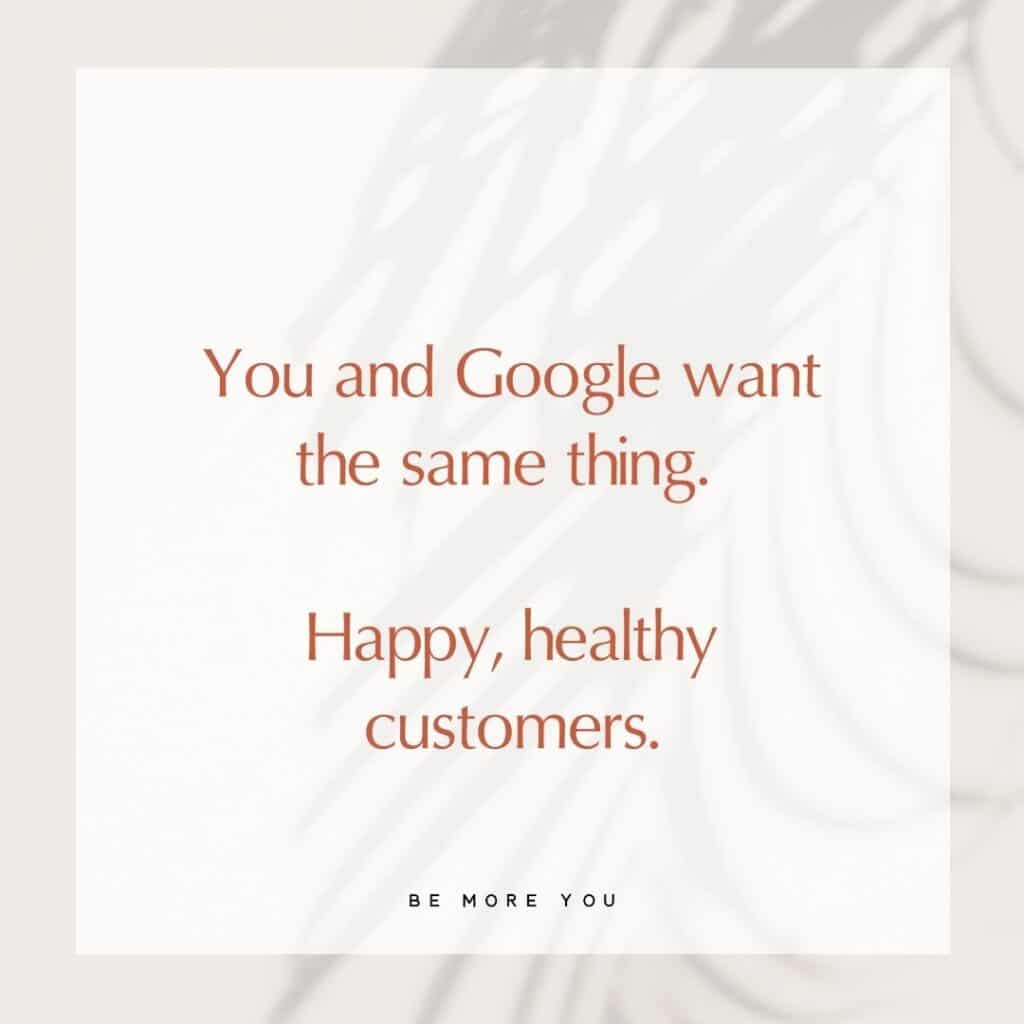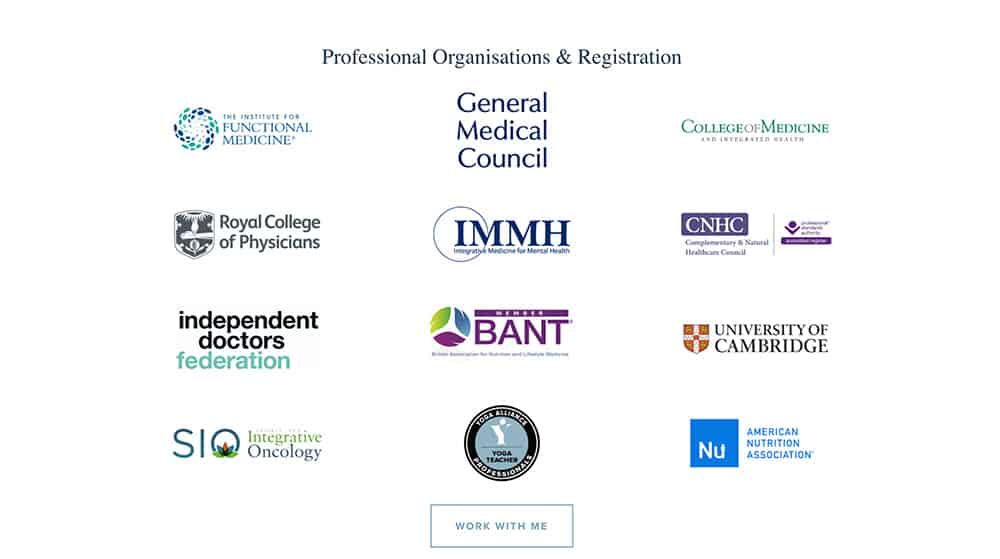YMYL: The Google algorithm health & wellness brands need to know about
Share this post


BE MORE YOU | BRAND STRATEGIST, DESIGNER & SEO EXPERT
You may have heard about Google’s YMYL algorithm, and the impact it will have on your health and wellness business. But what is YMYL? What does it stand for? Who will be affected by it and how do you make sure that you’re not one of them? These are all questions we’ll answer in this blog post.
In September 2019, Google rolled out an update to its algorithm that shook up search rankings for many websites, particularly sites with a focus on health and medicine. It earned the unofficial name of the “medic update” and caused many websites to think about best practices for YMYL site SEO – especially those concerning healthcare.
YMLY is the acronym being used by Google and other search engines as they continue to refine their algorithms and create more advanced ways of ranking websites. YMYL stands for Your Money or your life and it affects how content that impacts people’s health, wellness or finances is ranked on google.
So if you work in the medical field or provide health and wellness products or services then you need to understand how the YMYL algorithm will impact how your business is found online.
In fact, this is one of the most important things health & wellness brands need to know about! This blog post will explain exactly what YMYL means, who it affects, why your website should be set up a certain way if you’re in the health or wellness industry, and how to get yourself ranked on google.
What is YMYL?
YMYL is an algorithm released by Google and it is designed to help google identify websites that offer information related to health or finances.
The algorithm can come into play if a person searches for medical advice online – in order of what they find first will be their preferred source when looking at potential treatments etc.
YMYL is an algorithm update that changes the way information about health and wellness is ranked on Google. It primarily affects health and wellness websites, but it has wider implications for the quality of content required online.
YMYL stands for Your Money or Your Life and it marks a significant change for those in the health and wellness industries. YMYL is designed to give search preference to high-quality, credible content and to protect internet users from fake news, incorrect information, and websites that are not meeting essential standards.
As google’s algorithm is updated, it will favour websites that provide high-quality, trustworthy content and are safe to use based on its own standards; this means more traffic coming your way if you’re following all their guidelines.
Who does the YMYL Algorithm affect?
YMYL affects a number of different industries but predominantly sites with medical or health care information or sites offering financial advice.
In the health and wellness world this could affect those practising:
- Medicine and integrative medicine
- Nutrition and nutritional therapy
- Mental health practitioners
- Chiropractic Treatment
- Oncology and integrative oncologist
- Osteopathy
- Counselling
- Naturopathic healthcare
- Herbalists
- Supplements
- Alternative health care
- Holistic Health care
- Health coaches
- Fertility Coaches
- Midwifery & Doulas
- Acupuncture and acupressure
- Reflexologists
The YMLY algorithm is able to detect sites with medical or health care information present. It will rank websites higher on Google’s search page if they’re following all the guidelines set by this update and have good content for visitors to read.
The Google Algorithm Health & wellness brands need to know about
The first thing you need to understand about the google algorithm is this. You and google want the same thing. Happy and healthy customers.
Google algorithms are designed to improve the quality of content that is delivered for any defined search term. YMYL is no different. Google wants to serve the most relevant, high-quality content to its users, especially when it comes to serving information that could affect its users’ health.
YMYL is designed to protect internet users from fake news, incorrect information, and websites that are not meeting essential standards of information.

YMYL isn’t just an algorithm to work around, it provides clear guidelines for providing credible information online.
As an expert in the field of health and wellness, it should already be a priority of yours to provide high quality, credible information to your clients.
Google wants the same thing as you. And YMYL delivers that.
It provides a framework for brands and professionals in the health & wellness industry to create quality content for their website – which includes: credibility (both online authority visits as well ranking), trustworthiness among your customer base or audience and authenticity (you are who you say you are).
This goes alongside its EAT framework – expertise, authority & trust
How does the YMYL algorithm work?
In a nutshell, the algorithm wants consumers to be able trust what they are reading on their search engine results page. If your content is high quality and meets these guidelines then you will rank higher than brands that do not meet them – even if someone has more links or social media following!
So while it might seem like there’s an unfair advantage here for health & wellness practitioners already ranking well in organic rankings – all of us now have access to make our website a trustworthy online destination by meeting YMYL standards through good old fashioned SEO practices:
- link building (get some great tips from this article)
- producing engaging long-form blog posts
- provide contact information directly off-site where users can sign up easily before visiting and
- follow the YMYL guidelines listed in this article.
Why are health and wellness brands at risk?
YMYL was created as a response to the proliferation of information available on the internet that has the ability to damage a person’s health, wellbeing and finances.
The algorithm works by artificially boosting a web page’s ranking in Google searches when the content on that site is deemed to be trustworthy and valuable.
Historically, health and wellness brands haven’t been known for their incredible online marketing skills and many websites fall far below the standard required by google to rank highly.
Why Health and Wellness needs YMYL
In the offline world, we know that doctors and nurses undergo extensive training to practice.
Offline, Medical practitioners need to comply with local and national authority standards, ethical guidelines, provide minimum standards of care and are overseen by a professional body.
Online, in contrast, anyone can present themself as an expert, build a huge following and hand out medical advice without proof of qualifications, knowledge or medical know-how.
Improving the quality of health education through YMYL
In the past, it has been possible for information from unqualified Influencers to be ranked more highly than credible, evidence-backed information from qualified individuals.
Because Google has become the first port of call for most people when it comes to their health, this means they carry a heavy responsibility for policing the quality of the information available on their platform.
YMYL has been put in place to ensure that Google’s users are not being misled about their health or given misinformation.
If you’re found lacking under YMYL guidelines, you could be penalised by Google, with a lower search ranking, which means fewer people visiting your website.
This could open up opportunities for competitors to have more visibility than you, leading to fewer clients coming through doors too…
Bad news if your website needs work and your content is lacking. Good news if you’re willing to create high-quality information for your audience.
So far as health professionals go you need to apply the same high standards to the quality of your website and content as you do your patient care and treatments. Google now view these as one and the same.
YMYL and EAT
Much has been said about algorithms but Google’s primary goal is to serve the most relevant, high-quality content to its users. The YMYL algorithm does just that using both YMYL and EAT.
YMYL focuses on three key areas summarised as EAT – expertise, authority and trustworthiness. And prioritises its search results according to the most relevant content for the search term that ranks highly for expertise, authority and trust factors.
In truth expertise, authority and trust aren’t just areas to focus on for SEO purposes, they’re key to becoming a standout expert in any field and a foundation of building an impactful brand.
The algorithm is looking for evidence of these three things on your site and in the content that you publish online – they should be prevalent across all levels, from blog posts to images or videos shared with followers via social media channels like Instagram & Facebook.
It can work both ways: a brand might have great expertise but not enough authority;
If your expertise, authority and trust (EAT) ratio isn’t strong at every level then Google can penalize your site by removing it entirely off their search page listings when people are searching about specific topics related to YMYL industry keywords.
Google Algorithm: What does EAT relate to
Google EAT: Expertise
Google wants to see that you are able to demonstrate knowledge and expertise within a specific area.
Do you remember the phrase – ‘Jack of All Trades, Master of None?’ This is how Google will view your website if the content you share is scattered.
If you’re a nutritionist who also shares fashion tips, interior design advice and a travel journey, Google will get confused and struggle to recognise you as an expert in any one of these areas.
But guess what, so will your prospective clients so it’s important to niche your content and be crystal clear on what your website is about is important and the education and value you deliver.
Create 3-5 pillar categories for content that you stick to to begin with. As you establish your expertise in a specific area you will be able to branch out into other areas.
Make sure you are sharing lots of valuable information for your area of expertise and wherever possible interlink your content so that Google can see that you have related content on your website.
If you have a site with several valuable articles on a specific subject that are all interlinking you will be seen as more of an expert than if you have a site with just 1 great article on that subject.
Providing, valuable, niche content, specific to your area of expertise is key here.
Google EAT: Authority
Google will be looking for cues that show you are an authority in this area.
An authority is someone who has significant knowledge, experience or expertise in a particular area.
Google will be looking for cues that show you are an authority in your chosen area.
Things that qualify you as an authority:
- qualifications
- experience
- affiliations
- accreditations
Make sure that you list all of the above on your about page or create a page that is specifically about you, where you can link to anywhere your name is mentioned. This About Page for Dr Nina Fuller Shavel contains details of her qualifications, accreditations, guest appearances and links to various podcasts she has appeared on.
Also mention important authority cues within your author bio on any blogs.


Other things that build authority
- A large audience or social following
- Guest appearances at industry events
- Appearing as a guest expert on relevant blogs or podcasts
- Relevant press coverage
Provide links to guest blogs, guest podcasts, speaker events, your social media channels etc from your about page. Include social proof bars that state ‘as seen in’
Providing Authority Links
Another way to demonstrate authority is to link to authoritative industry sources within your article. so if you are writing an article on the benefits of yoga on patients undergoing cancer treatment you might want to link to a published research paper, the NHS website a news article in a quality publication or a recognised authority in the area of Integrative Oncology.
Google sees providing links to other helpful and authoritative sources as a good thing. So don’t be afraid to hyperlink to quality information on that topic.
Google EAT: Trustworthiness
The trust signals that Google looks for are the same things your potential customers are looking for as reassurance.
Site security (SSL)
An SSL certificate is essential for any website. It’s the thing that turns your website from HTTP: to HTTPS: with that little security lock symbol.
Having an out of date SSL certificate won’t just hit your google ranking. It can stop potential customers from even clicking on your website. Most people won’t click on your website when faced with warnings of potential security threats.
Most quality web hosting can include an SSL certificate as part of your hosting package. Just be sure to select the automatic renewal so you don’t accidentally run out.
Building Trust through reviews and testimonials
Buyers trust reviews and testimonials because they’re based on the opinions of real people, not just marketing speak.
Google reviews on Google my Business listings carry the most weight when it comes to Google ranking factors. So if your primary goal is to improve your google search results, you should aim to collect reviews on your Google my Business listing first.
Yelp and Yell reviews feed Amazon Alexa, so reviews here are great for showing up in voice searches. “Alexa, find me a nutritionist…”
Facebook is also a good place to collect reviews if that’s where your audience is, Google does recognise them but you should primarily focus your efforts on your google my business reviews.
Review sites like TrustPilot might be useful if you are a large e-commerce site, but for a health and wellness practitioner or other small business I would focus on building up your reviews on:
- Google reviews
- Yell and Yelp
Gaining more reviews to improve your SEO
There are a number of ways you should go about getting reviews and testimonials from your customers. I recommend building in a review request as part of your customer experience.
Trustworthiness and Site age
Just as a company that’s stood the test of time is generally more trusted than an unproven startup, a website that’s been around for 10 years will be deemed more trustworthy than a site that’s just popped up a week ago.
There’s not a lot you can do about the age of your website so focus on other trust factors like creating happy customers and gathering reviews.
Trustworthiness and Legitimacy
Make sure that you have a clear cut line between promotional copy (marketing material) from the actual valuable information.
If you have any sponsored content it must be clearly labelled as such. And any affiliate links should be clearly stated as such to avoid misleading users about who might benefit financially if they click through those pages.
Transparency is key when building trust.
What can be done to avoid being penalized by the algorithm?
I’m sure by now you realise the implications and importance of YMYL and EAT and are probably wondering “How can I avoid being penalized by the Google Algorithm for not meeting quality standards?”
That’s simple – focus on Quality, Quality, Quality!
Whilst there are over 200 ranking factors that can affect your Google Search Ranking, Google is pretty clear about the quality standards they expect you to stick to. They provide information on Google Search Central (formerly webmaster tools) for anyone creating a website or writing a blog. It’s a great place to start learning about what’s expected of you and it’s not as complicated as you’d think.
YMYL Tip: Create high-quality content
It’s essential for a health or wellness brand to have high-quality content. The new Google Algorithm changes things and now penalizes websites that provide low-quality information.
- Avoid thin content – the average top ranking article on google is about 2000 words. Your content should be in-depth and thorough.
- Research and reference your content – use external and internal links
- Use proper formatting. Content should be well-laid out and easy to read – use a tool like Hemmingway editor to check that it’s not too complex.
- Include media like relevant images and video
- Don’t use generic or duplicated information (no copying and pasting from other sources).
- Avoid misleading ads – make sure that any ad you create on your website has the “ad” label, so people know it’s an advertisement and avoid phrases like ‘click here’ in order for them to click.
- Don’t link to spammy sites and don’t seek backlinks from spammy sites.
Follow YMYL Guidelines
YMYL guidelines state that google favours sites that have a strong online presence that are authoritative and well-cited.
To satisfy these guidelines you need to ensure your website is set up with the following:
- A blog or content page where people can browse through articles from experts in their field of practice (i.e doctor’s blogs). Any content must be well-researched and have original sources cited.
- Only cite research or evidence from credible sources i.e. not Wikipedia
- An FAQ section for common questions related specifically the practice
- A contact page for people to ask questions or request more information.
- Testimonials, videos and case studies showing happt customers
- Mobile Responsive – All content should be easily accessible for visitors on mobile devices and other platforms (i .e website must work well with Google Chrome, Safari).
- Your about page should link to any industry accreditations you have, it should list certifications your business has and your qualifications and training.It should list any industry events you have spoken at, link to any guest podcasts, articles and professional affiliations
- You should also include a disclaimer page that tells visitors they are on the website of an individual practitioner and not affiliated with any other medical organization.
What are some Website best practices I should be following?
You’ll want to ensure that you’re in compliance with YMYL guidelines and regulations set forth by Google’s algorithm.
- Make sure you use an SSL certificate on your site.
- Go deep, not wide, when it comes to your content creation. I.e. Forget general content, niched, highly specific content for a single area of expertise will tend to do much better – at least until you have established your online authority.
- Well designed website with easy to follow navigation
- Your website needs: -A domain name (ex. mynameisexample.com) with an SSL certificate – HTTPS://
- Consistent NAP references – Name, Address, Phone
- Updating your content periodically
How often I should update my site, etc.?
You should update your site and blog post content as often it’s needed. But, a good rule of thumb is to have new posts published at least every week or two if not more frequently than that depending on the type/volume you’re publishing – so always try for fresh material.
Make sure that you don’t just add new blogs. It’s important to periodically refresh older blogs with up-to-date information and research. etc
- Publish fresh content at least every week or two.
- Update old posts with up to date information and research.
- Keep a balance of new, current and old blog post content on your site to ensure visitors are getting the most relevant/recent content
It’s also a good idea to refresh the imagery on your website every year or so to keep your brand looking fresh and to avoid looking out of date.
What content types are allowed on my site or blog post
The YMYL article allows all types of content to be shared.
However, whatever content you share, be it an opinion article, blog post, Web page, video or other it must be well presented with facts, preferably with links to supplementary or supporting evidence and research from credible sources and without misleading health information.
Fringe opinions and unsupported health claims will be deprioritised in favour of more credible and accepted sources.
For this reason, you should avoid making any unsubstantiated health claims and use relevant caveats wherever possible.
YMYL Summary
When it comes to the health and wellness industry YMYL is a welcome addition to the wild west of the internet and it’s something any health and wellness business should be aware of and welcome with open arms
If you want to discuss YMYL, SEO and content for your business get in touch and we can discuss ways to work together.




